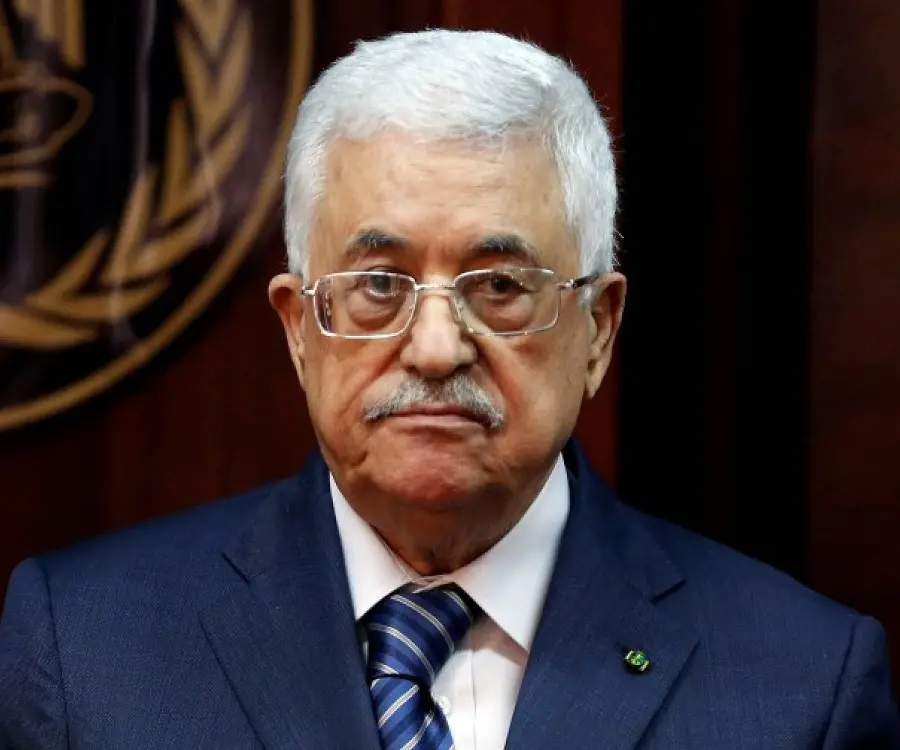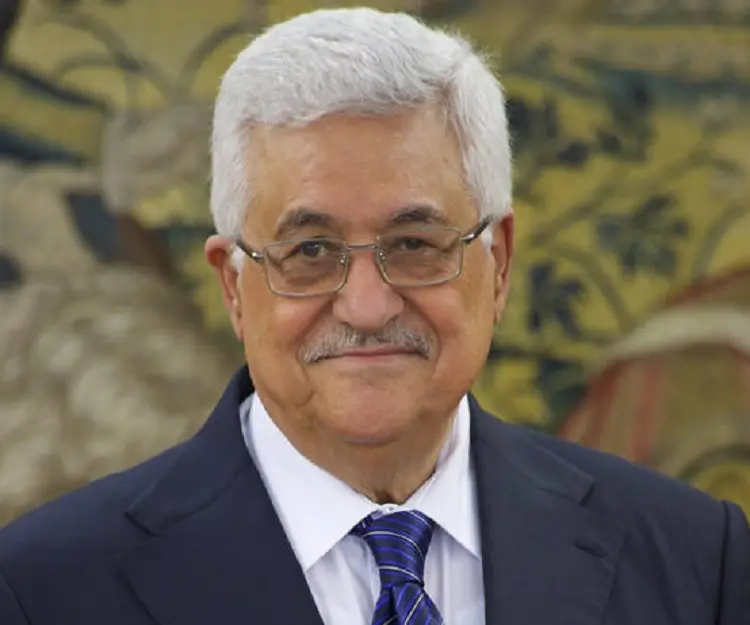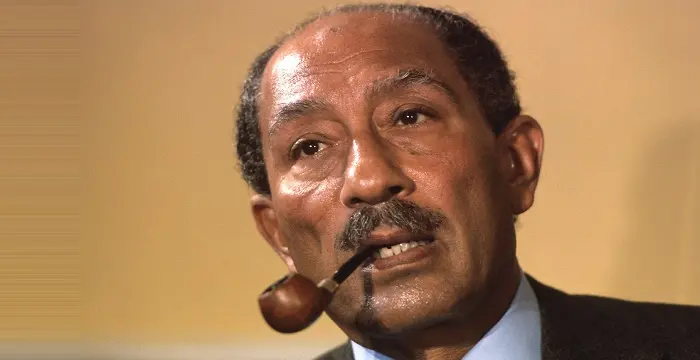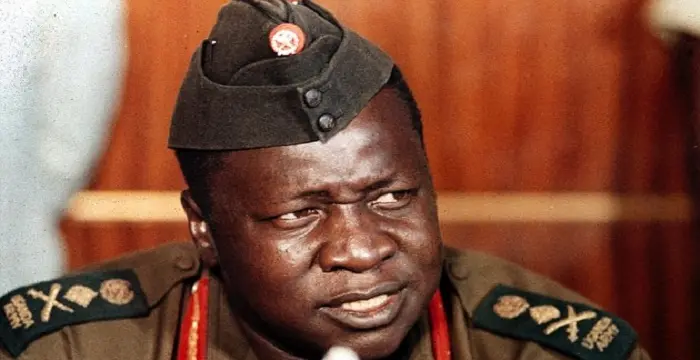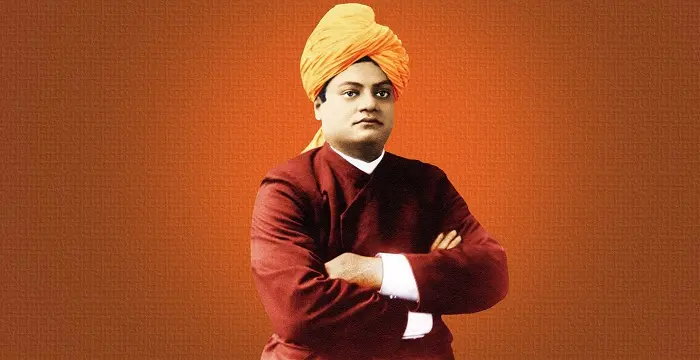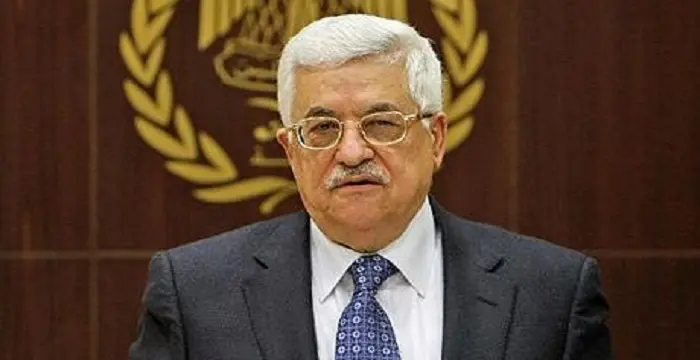
Mahmoud Abbas - President of the State of Palestine, Birthday and Personal Life
Mahmoud Abbas's Personal Details
Mahmoud Abbas, also known by the kunya Abu Mazen or the Father of Mazem, is the President of Palestinian National Authority since 2005
| Information | Detail |
|---|---|
| Birthday | March 26, 1935 |
| Nationality | Palestinian |
| Famous | Leaders, Presidents, Palestinian National Authority, President of the State of Palestine |
| Spouses | Amina Abbas |
| Known as | Abu Mazen |
| Childrens | Mazen Abbas, Tareq Abbas, Yasser Abbas |
| Universities |
|
| Founder / Co-Founder |
|
| Birth Place | Safed |
| Political Ideology | Political party- Fatah |
| Religion | Islam, Sunni Islam |
| Gender | Male |
| Sun Sign | Aries |
| Born in | Safed |
| Famous as | President of the State of Palestine and Palestinian National Authority |
Mahmoud Abbas's photo
Who is Mahmoud Abbas?
Mahmoud Abbas is the President of Palestinian National Authority since 2005. He is best known for his pragmatic approach towards Palestine-Israel conflict. He started his political career in the middle of 1950s while working at Qatar. Later he was picked up by Yasser Arafat to join the Fatah party, which was at the forefront of the Palestinian armed struggle and later became the dominant partner of the Palestinian Liberation Organization. While the group was keen on armed struggle Abbas and his associates gave a call for talks with moderate Israelis. Later, as the organization began to grow, he was given diplomatic duties. When in 2003, United States of America refused to negotiate with Arafat he became the more visible face of the organization and was appointed the Prime Minister of Palestinian National Authority. After Arafat’s death, he became the Chairman of PLO and also the President of Palestinian National Authority. During this period, he not only had to tackle the Israelis, but also armed groups like Hamas. He used his office to wrestle an implicit recognition from United Nation as an independent state.
Childhood & Early Life
Mahmoud Abbas was born on March 26, 1935 in Safed, also known as Zefad. The town is located in the Galilee region of Northern Israel, but earlier fell under the Mandatory Palestine.
When the Palestine War broke out in 1948, he, along with his family, fled to Syria. Mahmoud did his schooling there. Later he studied law at University of Damascus and after graduation, moved to Egypt. For some time, he worked as an elementary teacher.
Later in late 50s, he went to Qatar and took up services under the Emirate’s civil service as Director of Personnel. Here he came in contact with exiled Palestinian leaders and was initiated into politics.
Much later, he went to Moscow and enrolled at Patrice Lumumba University to do his doctorate. The theme was ‘The Connection between the Nazis and the Leaders of the Zionist Movement’. He received his Candidate of Science Degree (Russian equivalent to PHD) in 1982.
Later in 1984, he published this work as a book titled ‘The Other Side: the Secret Relationship Between Nazism and Zionism’. It was written in Arabic. In it he tried to establish that the number of deaths in the Holocaust was actually a lie and the Jews, who died at the concentration camp was in reality victims of Nazi-Zionist conspiracy.
Early Political Career
Mahmoud Abbas was initiated into politics while living in Qatar sometime in late 50s. In 1961, he was recruited by Yasser Arafat and absorbed in Ḥarakat al-Taḥrīr al-Waṭanī al-Filasṭīnī (Palestine National Liberation Movement), popularly known as Fatah or Fath.
It was an underground political organization, co-founded by Yasser Arafat, with the aim of wrestling Palestine from Israeli control by armed struggle. Fatah later came to dominate Palestine Liberation Organization. In 1968, Abbas joined the Palestine National Council and also became a member of the Executive Committee of Palestine Liberation Organization.
Abbas also donated considerably towards the cause of the organization. According to Abu Daoud, who masterminded 1972 Munich Massacre, Abbas provided the fund; albeit without knowing how the money was going to be used.
In late 1970s Abbas began to head the International Department of PLO. In this capacity, he was entrusted with the task of presenting PLO policies in a more moderate light. Very soon, he started advocating talks with Israel. In 1977, he made the first contract with peace groups in Israel.
In 1990s, Abbas was entrusted with the task of shaping Palestinian negotiating strategy for the peace conference to be held in 1991 in Madrid. Later he also prepared the peace strategy for the secret meetings to be held with the Israelis in Oslo.
However, in 1990-91, PLO developed a strained relationship with Saudi Arabia over its support for the Iraqis in the Persian Gulf War. In January, 1993 Abbas visited Saudi Arabia and mended PLO’s relationship with that country.
His position in the PLO became even more defined at the time of signing ‘Oslo I Accord’ on September 13, 1993 in Washington DC. Abbas signed the document for PLO in the presence of the organization’s Chairman Yasser Arafat, American President Bill Clinton and Israeli Prime Minister Yitzhak Rabin.
Next in 1995, Abbas represented PLO while signing a draft agreement named Beilin-Abu Mazen agreement. Unfortunately, it was later rejected by both sides.
As Leader
By 2003, Abbas began to emerge as more visible face of Palestinian leadership. By then, both Unites States and Israel had refused to deal with PLO Chairman Yasser Arafat. Abbas, being one of earliest members of Fatah, was naturally chosen to replace him. Besides, he was equally acceptable to the West.
On March 19, 2003 Abbas was appointed by Arafat as the Prime Minister of Palestinian National Authority. On coming to power he immediately renounced terrorism and promised to end uprising against Israel and create a single Palestinian armed force.
However, Arafat kept on interfering in every matter and the tussle of power between the two leaders continued. Finally, Abbas resigned from office on September 6, 2003. During this short stint he also had to deal with Palestinian militant groups that preferred a more hard-line approach.
Although he stepped down from the office, there was no challenge to his leadership. When Arafat died in November 2004, Abbas became the majority choice. He became the Chairman of PLO and also won the Presidential election, held in January 9, 2005, by garnering 60% of votes.
As President of Palestine National Authority, he gave a call for end of violence and prescribed peaceful resistance. However, he could not disarm the militant groups and in direct challenge to his authority they launched attacks on January 12 and 13 killing many Israeli.
As a result the Israeli authority cut off relationship with Abbas stating that he must now show his genuine desire for peace by controlling such elements. In spite of that Abbas was sworn in as the President of Palestine National Authority on January 15. The ceremony was held at Ramallah in West Bank.
He was confronted with greater problems after the legislative election, held on January 25, 2006. In it, candidates backed by militant group Hamas won the majority seats. A short-lived Fatah-Hamas coalition government was formed. But violence continued to spread.
Abbas’ term as President ended on January 9, 2009. However, he extended the term for one year and continued to do so stating Basic Law gave him the right. Although Hamas disputed such claims in the beginning, in May 2011, he was accepted as the leader of the interim government.
In 2010, he participated in another round of peace talk with Israel, but it failed. He next concentrated on gaining international recognition for Palestine. In September 2011, he submitted a request for Palestine’s admission in the United Nation as an independent state; a move that was opposed by the US and Israel.
When nothing came out of such request, Abbas next submitted a draft resolution to the general assembly, which asked for elevation of the status of Palestine Mission within UN from Permanent Observer to Nonmember Observer State.
The resolution granting such request was passed on November 29, 2012 by 138 to 9 votes. 41 countries abstained from voting. As a result, Palestine got an implicit recognition as an independent state and could now become member of different international bodies.
Personal Life
Mahmoud Abbas is married to Amina Abbas; the couple has three children named Mazen Abbas, Yasser Abbas and Tareq. Among them Mazen Abbas has passed away at the age of 42 while Yasser Abbas is a Canadian businessman and Tareq works as a business executive,
Abbas has so far penned down two books. His first book, ‘The Other Side: the Secret Relationship Between Nazism and Zionism’, written in Arabic, is based on his doctoral thesis ‘The Connection between the Nazis and the Leaders of the Zionist Movement’. His second book, ‘Through Secret Channels: The Road to Oslo’, is a memoirs of the Oslo agreement.
// Famous Presidents
Khalifa bin Zayed Al Nahyan
Sheikh Khalifa bin Zayed Al Nahyan is the current President of the United Arab Emirates (UAE). Check out this biography to know about his birthday, childhood, family life, achievements and fun facts about him.
Anwar Sadat
Anwar Sadat was the third President of Egypt and has been awarded the Nobel Prize for his peace initiatives. To know more about his childhood, career, profile and timeline read on the following biography.
Idi Amin
A Ugandan dictator, Idi Amin is remembered for his brutal regime and crime against humanity. Check this biography to know in details about his life, childhood, profile and timeline.
Mahmoud Abbas biography timelines
- // 26th Mar 1935Mahmoud Abbas was born on March 26, 1935 in Safed, also known as Zefad. The town is located in the Galilee region of Northern Israel, but earlier fell under the Mandatory Palestine.
- // 1948When the Palestine War broke out in 1948, he, along with his family, fled to Syria. Mahmoud did his schooling there. Later he studied law at University of Damascus and after graduation, moved to Egypt. For some time, he worked as an elementary teacher.
- // 1961Mahmoud Abbas was initiated into politics while living in Qatar sometime in late 50s. In 1961, he was recruited by Yasser Arafat and absorbed in Ḥarakat al-Taḥrīr al-Waṭanī al-Filasṭīnī (Palestine National Liberation Movement), popularly known as Fatah or Fath.
- // 1968It was an underground political organization, co-founded by Yasser Arafat, with the aim of wrestling Palestine from Israeli control by armed struggle. Fatah later came to dominate Palestine Liberation Organization. In 1968, Abbas joined the Palestine National Council and also became a member of the Executive Committee of Palestine Liberation Organization.
- // 1972Abbas also donated considerably towards the cause of the organization. According to Abu Daoud, who masterminded 1972 Munich Massacre, Abbas provided the fund; albeit without knowing how the money was going to be used.
- // 1977In late 1970s Abbas began to head the International Department of PLO. In this capacity, he was entrusted with the task of presenting PLO policies in a more moderate light. Very soon, he started advocating talks with Israel. In 1977, he made the first contract with peace groups in Israel.
- // 1982Much later, he went to Moscow and enrolled at Patrice Lumumba University to do his doctorate. The theme was ‘The Connection between the Nazis and the Leaders of the Zionist Movement’. He received his Candidate of Science Degree (Russian equivalent to PHD) in 1982.
- // 1984Later in 1984, he published this work as a book titled ‘The Other Side: the Secret Relationship Between Nazism and Zionism’. It was written in Arabic. In it he tried to establish that the number of deaths in the Holocaust was actually a lie and the Jews, who died at the concentration camp was in reality victims of Nazi-Zionist conspiracy.
- // 1990 To 1993However, in 1990-91, PLO developed a strained relationship with Saudi Arabia over its support for the Iraqis in the Persian Gulf War. In January, 1993 Abbas visited Saudi Arabia and mended PLO’s relationship with that country.
- // 1991In 1990s, Abbas was entrusted with the task of shaping Palestinian negotiating strategy for the peace conference to be held in 1991 in Madrid. Later he also prepared the peace strategy for the secret meetings to be held with the Israelis in Oslo.
- // 13th Sep 1993His position in the PLO became even more defined at the time of signing ‘Oslo I Accord’ on September 13, 1993 in Washington DC. Abbas signed the document for PLO in the presence of the organization’s Chairman Yasser Arafat, American President Bill Clinton and Israeli Prime Minister Yitzhak Rabin.
- // 1995Next in 1995, Abbas represented PLO while signing a draft agreement named Beilin-Abu Mazen agreement. Unfortunately, it was later rejected by both sides.
- // 2003By 2003, Abbas began to emerge as more visible face of Palestinian leadership. By then, both Unites States and Israel had refused to deal with PLO Chairman Yasser Arafat. Abbas, being one of earliest members of Fatah, was naturally chosen to replace him. Besides, he was equally acceptable to the West.
- // 19th Mar 2003On March 19, 2003 Abbas was appointed by Arafat as the Prime Minister of Palestinian National Authority. On coming to power he immediately renounced terrorism and promised to end uprising against Israel and create a single Palestinian armed force.
- // 6th Sep 2003However, Arafat kept on interfering in every matter and the tussle of power between the two leaders continued. Finally, Abbas resigned from office on September 6, 2003. During this short stint he also had to deal with Palestinian militant groups that preferred a more hard-line approach.
- // Nov 2004 To 9th Jan 2005Although he stepped down from the office, there was no challenge to his leadership. When Arafat died in November 2004, Abbas became the majority choice. He became the Chairman of PLO and also won the Presidential election, held in January 9, 2005, by garnering 60% of votes.
- // 25th Jan 2006He was confronted with greater problems after the legislative election, held on January 25, 2006. In it, candidates backed by militant group Hamas won the majority seats. A short-lived Fatah-Hamas coalition government was formed. But violence continued to spread.
- // 9th Jan 2009 To May 2011Abbas’ term as President ended on January 9, 2009. However, he extended the term for one year and continued to do so stating Basic Law gave him the right. Although Hamas disputed such claims in the beginning, in May 2011, he was accepted as the leader of the interim government.
- // 2010 To Sep 2011In 2010, he participated in another round of peace talk with Israel, but it failed. He next concentrated on gaining international recognition for Palestine. In September 2011, he submitted a request for Palestine’s admission in the United Nation as an independent state; a move that was opposed by the US and Israel.
- // 29th Nov 2012The resolution granting such request was passed on November 29, 2012 by 138 to 9 votes. 41 countries abstained from voting. As a result, Palestine got an implicit recognition as an independent state and could now become member of different international bodies.
// Famous Leaders
Edi Rama
Edi Rama is the current Prime Minister of Albania. Check out this biography to know about his childhood, life, achievements, works & timeline.
Tecumseh
Tecumseh was a Native American leader of the Shawnee clan. This biography profiles his childhood, life and timeline.
Khalifa bin Zayed Al Nahyan
Sheikh Khalifa bin Zayed Al Nahyan is the current President of the United Arab Emirates (UAE). Check out this biography to know about his birthday, childhood, family life, achievements and fun facts about him.
Anwar Sadat
Anwar Sadat was the third President of Egypt and has been awarded the Nobel Prize for his peace initiatives. To know more about his childhood, career, profile and timeline read on the following biography.
Leo Varadkar
Cam Leo Varadkar is the current Taoiseach—the Prime Minister—of the Republic of Ireland. Check out this biography to know about his childhood, family life, achievements and other facts about his life.
Swami Vivekananda
Swami Vivekananda was the chief disciple of Sri Ramakrishna, and was responsible for awakening India spiritually. Check this biography to know in detail about his life, profile and timeline.
Mahmoud Abbas's FAQ
What is Mahmoud Abbas birthday?
Mahmoud Abbas was born at 1935-03-26
Where is Mahmoud Abbas's birth place?
Mahmoud Abbas was born in Safed
What is Mahmoud Abbas nationalities?
Mahmoud Abbas's nationalities is Palestinian
Who is Mahmoud Abbas spouses?
Mahmoud Abbas's spouses is Amina Abbas
Who is Mahmoud Abbas childrens?
Mahmoud Abbas's childrens is Mazen Abbas, Tareq Abbas, Yasser Abbas
What was Mahmoud Abbas universities?
Mahmoud Abbas studied at Damascus University, Peoples' Friendship University of Russia
Which company or organization was founded by Mahmoud Abbas?
Mahmoud Abbas was the founder/co-founder of Palestine Liberation Organization
What is Mahmoud Abbas's political ideology?
Mahmoud Abbas's political ideology is Political party- Fatah
What is Mahmoud Abbas's religion?
Mahmoud Abbas's religion is Islam, Sunni Islam
What is Mahmoud Abbas's sun sign?
Mahmoud Abbas is Aries
How famous is Mahmoud Abbas?
Mahmoud Abbas is famouse as President of the State of Palestine and Palestinian National Authority
